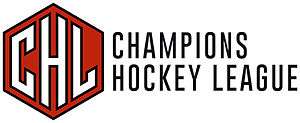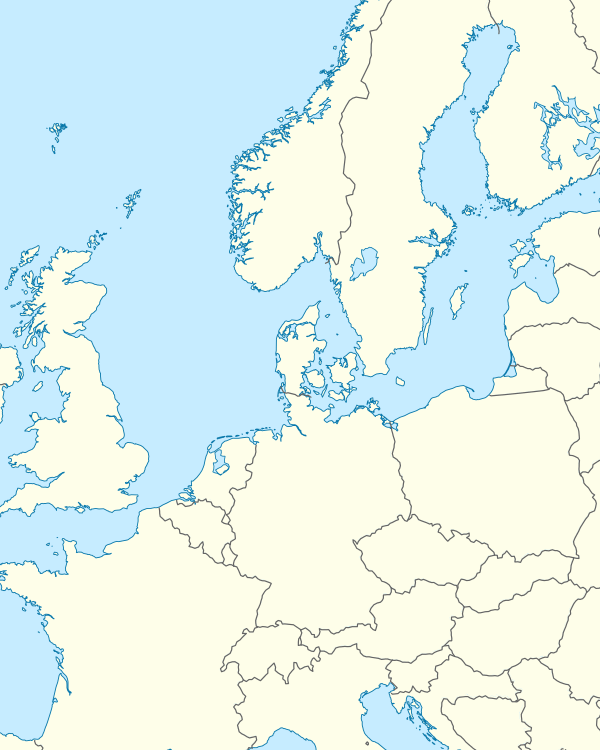Champions Hockey League
|
Current season, competition or edition: | |
 | |
| Formerly |
European Trophy Champions Hockey League (2008–09) |
|---|---|
| Sport | Ice hockey |
| Founded | 2013 |
| Founder | IIHF |
| Inaugural season | 2014–15 |
| CEO | Martin Baumann[1] |
| Claim to fame | EICC |
| No. of teams | 48 |
| Country | 13, in Europe |
| Most recent champion(s) |
|
| Most titles |
|
| Qualification | Top teams in first-tier leagues |
| TV partner(s) |
Austria: LAOLA1.tv (online livestream) Brazil: ESPN[2] Canada: Sportsnet Central America: TD Centro Czech Republic: SlovakSport.TV Europe: Eurosport Finland: MTV France: L'Équipe 21 Germany: Sport1 (TV) and LAOLA1.tv (online livestream) Great Britain: Premier Sports Mexico: Televisa Deportes Network Slovakia: SlovakSport.TV South America: DirecTV Sweden: SVT Switzerland: SRG SSR and Teleclub[3] USA: ONE World Sports[4] and Univision Deportes Network |
| Official website | ChampionsHockeyLeague.net |
The Champions Hockey League is a European ice hockey tournament launched by 26 clubs, 6 leagues and the International Ice Hockey Federation (IIHF), which started in the 2014–15 season. The tournament features several teams from the first-tier leagues of at least six countries in Europe.
Background
The IIHF launched a tournament with the same name in 2008 to coincide with the IIHF's 100th anniversary. The tournament's only season was played between 8 October 2008 and 28 January 2009, and was won by the ZSC Lions who got to play in the 2009 Victoria Cup game as a result. The IIHF planned to launch another season, but was ultimately forced to cancel the tournament due to problems with finding sponsors and failure to agree on a format. On 9 December 2013, the IIHF officially announced that they had launched a new tournament with the same name, born out of the European Trophy, starting in the 2014–15 season.[5]
Seasons
Overview
| Season | Teams | Matches | Att. avg. | Champion | Runner-up |
|---|---|---|---|---|---|
| 2014–15 | 44 | 161 | 3,049 | |
|
| 2015–16 | 48 | 157 | 3,261 | |
|
| 2016–17 | 48 | 157 |
2014–15 season
The 2014–15 season was played between August 2014 and February 2015. 44 clubs from 12 different European countries participated in the season, divided into 11 groups of four teams each. Each team played a double round-robin in their group, for a total of 6 games per team. The 11 group winners as well as the top five group runners-up qualified for the playoffs. The playoffs were as a single-elimination tournament, with all rounds leading to the final played in two-game, home-and-away, total-goal series. The final was a single game. In total, 161 games were played, including the group and playoff stages.[5][6] The season was won by Luleå HF which defeated Frölunda HC in the final.
2015–16 season
For the 2015–16 season, the tournament has been expanded to 48 teams, divided into 16 groups with three teams in each group. The two first teams in each group advanced to the playoff round of 32.[7] The 48 teams consisted of the 26 founding A-licence clubs, 12 B-licensed clubs from the founding leagues, and 10 C-licensed "Wild card" teams from other leagues. In total, 157 games were played. Frölunda HC won their first Champions League title by beating Oulun Kärpät in the final.
2016–17 season
The 2016–17 season is again be with 48 teams, using the same format as in the previous season. The season started on 16 August 2016 and is scheduled to end with the final game on 7 February 2017.
2017–18 season
Starting with the fourth CHL season, the championship will be reduced to 32 teams, and qualification will be on sporting merits only. The six founding leagues will be represented by between three and five teams (based on a three-year league ranking), while eight teams from the "challenge leagues" will be represented by one team each. No founding team will automatically be qualified.[8]
Teams
In the 2015–16 and 2016–17 seasons, 48 clubs from the first-tier leagues of at least ten different European countries participate. Teams can qualify for the tournament by obtaining either an A, B or C license.[6][7]
- A license: The 26 founding clubs are granted an "A license", provided that they play in the first-tier league of their respective system.[9]
- B license: Two teams—the top regular season team and the top playoff team in the previous season without an A license—from each of the founding leagues (Austrian EBEL, Czech Extraliga, Finnish Liiga, German DEL, Swiss NLA and Swedish SHL) also participate.[10] If these top teams are already founding clubs with A licenses, other teams from the league can take the B license spots. The order the B licenses are handed out is:[10][11]
- National champion
- Regular season winner
- Runner-up, regular season
- Play-off finalist
- Best placed semifinal loser
- Worst placed semifinal loser
- If the leagues after that still don't reach their guaranteed number of places (EBEL: 4; DEL, NLA and Extraliga: 5; SHL and Liiga: 6) the third and fourth placed team in the regular season also can be considered.[12]
- C license: The rest of the places go to "wild card" teams, from European first-tier leagues other than the founding ones. The C license teams are drawn from amongst the champions of the IIHF Continental Cup, Elite Ice Hockey League (United Kingdom), GET-ligaen (Norway), Ligue Magnus (France), Metal Ligaen (Denmark), Slovak Extraliga (Slovakia), Belarusian Extraleague (Belarus) and Polska Hokej Liga (Poland).[6][13]
Starting in the 2017–18 season, the CHL format will be drastically revamped to largely mirror the UEFA Champions League. The total number of teams will be reduced from 48 to 32, with 24 of the entries coming from the six founding leagues and all berths earned through on-ice achievement: the "founding clubs" will no longer be guaranteed a place in the competition. A maximum of five teams from each country are permitted, with the entries allotted to each country according to a coefficient system. The remaining eight places will be given to the champions of the Norwegian, Slovakian, French, Belarusian, Danish, British and Polish leagues, as well as the champion of the Continental Cup. The teams will then be drawn into eight groups of four, with the top two teams in each group advancing to the knockout stage, which will be contested as two-legged ties until a one-match final.[8]
Prize money
In the 2014–15 season, 40 teams competed for a grand total of 1.5 million euros.[6]
European Trophy
The winner of the Competition will receive the “European Trophy”.[14]
See also
- European Trophy, a similar tournament played annually from 2006, disbanded after 2013. European Trophy is the precursor to Champions Hockey League. The names of all four recent European Trophy winners are engraved in the Trophy.[15]
References
- ↑ "Staff". Champions Hockey League.
- ↑ "Semi-final referees and TV listings: Brazil among countries to watch CHL!". Champions Hockey League.
- ↑ "SRG and Teleclub gain exclusive CHL broadcasting rights in Switzerland". Champions Hockey League.
- ↑ "New broadcast agreements in Germany and Austria on SPORT1 and LAOLA1.tv". Champions Hockey League.
- 1 2 "New era dawns for Europe". International Ice Hockey Federation.
- 1 2 3 4 "Ready for takeoff". International Ice Hockey Federation. 2014-02-27.
- 1 2 "CHL to play with 48 teams in 2015–16". Champions Hockey League. 4 December 2014. Retrieved 4 December 2014.
- 1 2 "New CHL format for 2017–18! 32 teams & on-ice qualification only". championshockeyleague.net. 2016-06-14.
- ↑ "CHL: Ny era i europeisk klubbhockey". difhockey.se (in Swedish). Djurgårdens IF Hockey. 2013-12-09. Retrieved 2013-12-19.
- 1 2 Qualifikationskriterien für die Champions Hockey League
- ↑ New clubs join CHL
- ↑ "Sex nya lag klara för Champions League – så ser Växjös chanser ut" (in Swedish). Hockeysverige.se. 2014-03-26.
- ↑ "Belarus' Neman Grodno marks CHL foray into Eastern Europe". Champions Hockey League. 2015-02-19.
- ↑ http://www.championshockeyleague.net/about/about_chl/
- ↑ http://europeantrophy.com/news.php?news=321
